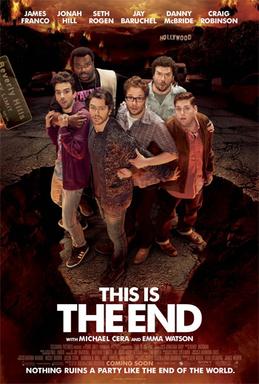
The Movie
Last week I saw This is The End.
On RottenTomatoes it earned on the Tomatometer an 85% from critics and an 84% from fans. These reviews, especially from the critics, surprised me because I thought the film was ok in humor but poor in message. I get why people liked this movie. It is irreverent, funny, and movie stars play a version of themselves that poke fun at the Hollywood lifestyle. It had funny parts and I laughed, but it wasn’t funny a-la Pineapple Express. I’ll be honest, up front, as a theologian I couldn’t get past the soteriology (the method a person is saved) in the film.
For the plot of the movie read this wiki entry.
The theologically inclined person will immediately notice that this movie is set within a world similar to Tim Lahaye‘s Left Behind Series with its rapture/tribulation theology. But, This Is The End has a stoner Hollywood twist.
Warning: Spoilers
Soteriology
So, after the good people are raptured, all hell breaks loose on earth: sinkholes, earthquakes, fires storms, and roaming devils. The gang waits it out for a while, but eventually decides they have to do something and get out of the house they are held up in. Through a series of events, they realize that if they are self-sacrificing and do a good deed, they will get beamed up to heaven.
The movies soteriology is clear: Doing Good Deeds = Going To Heaven.
I think American popular culture believes this for the most part. If my good deeds outweigh the bad, I get into heaven. It should be pointed out that this is not a Christian understanding of salvation.
Afterlife
In the end the gang makes it into heaven, which is a cloud city where people have wings and get whatever they can imagine. One character imagines a live performance by the Back Street Boys and the movie ends with a ruckus concert. This is not a Christian understanding of the afterlife.
The End
I worry that Christians will see this film and it will provide fodder for poor theology. A theology where good works get a person into heaven and where in the afterlife a person gets whatever they want.
Maybe I’m thinking too much about the theology of a stoner movie, but I can’t help but think that if it’s in the public arena it should be used for discourse.
-jpserrano
Did you see the movie? What did you think?
What was your take on the theology of the movie?
How does it similar or different to what you believe?
